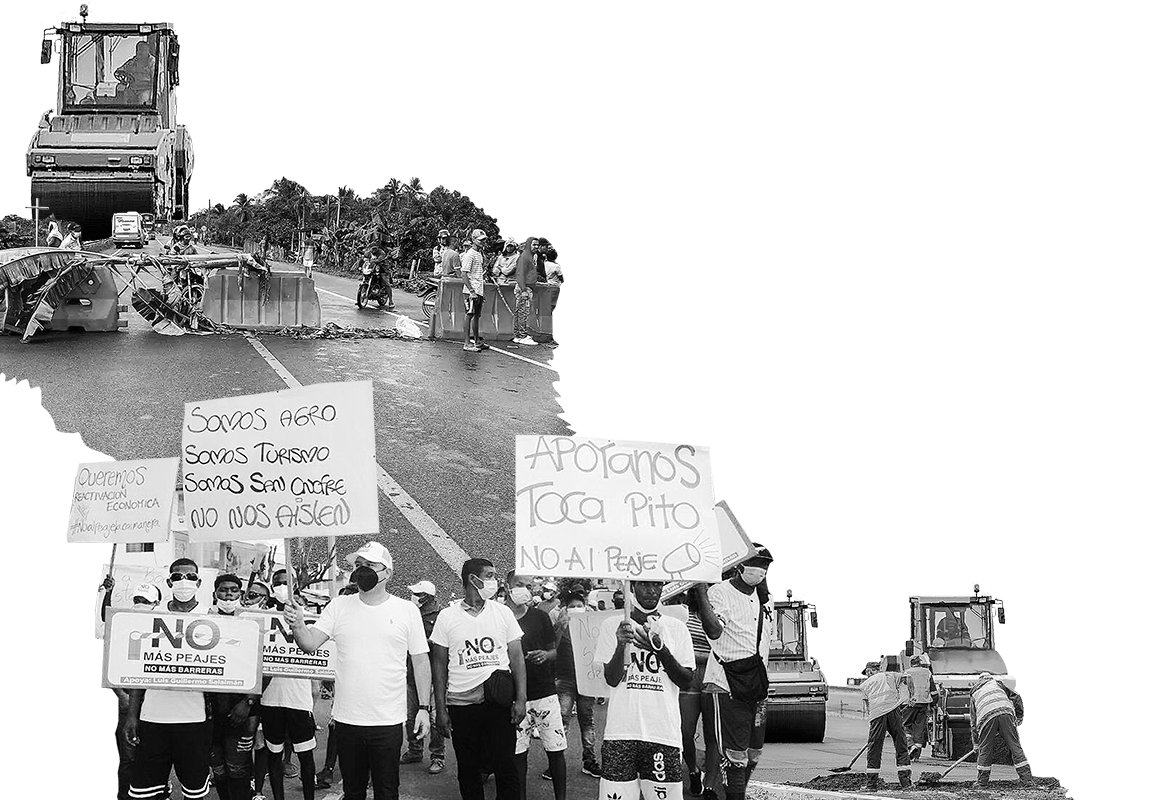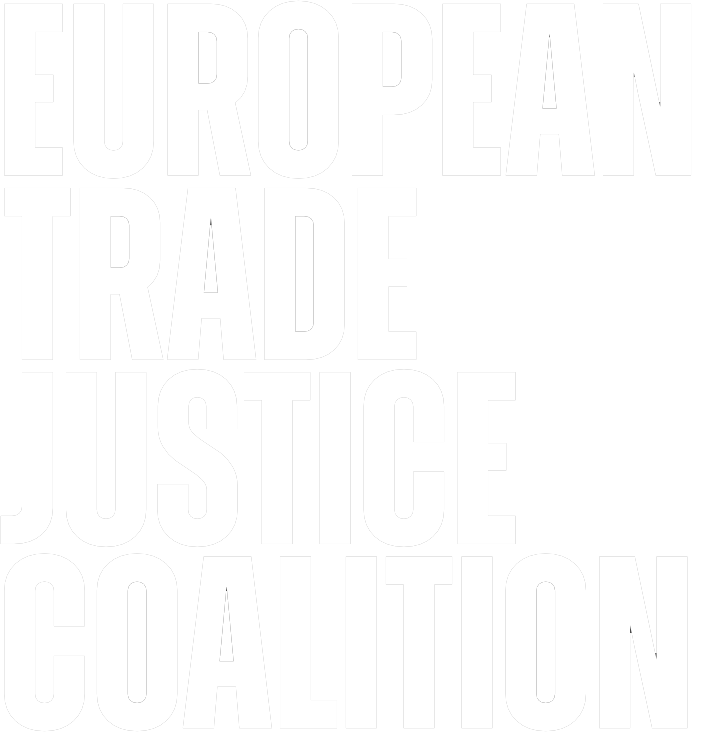
The investment fund suing over road blocks and toll profits
InfraRed vs Colombia
The international investor behind a public-private partnership road building project in Colombia is suing the government in a highly secretive case. InfraRed lacks an environmental permit for one piece of road and land titles for another. The company is impatient with national court processes that are likely to require it to spend more on environmentally sensitive design. It is also complaining about government caps on toll price increases. The threat of the ISDS case may have contributed to the government’s decision allowing the company to charge more.
The public-private route to the sea
The Ruta al Mar venture is a road building project in the north of Colombia. It covers around 500 km of road running from the mountains to the Caribbean sea, crossing traditional cattle ranching territory amid lowland wetlands.[1] The project mainly involves upgrading and maintaining existing roads. It is one of 29 projects in a country-wide programme,[2] launched in 2013, to develop Colombia’s public road infrastructure.
The programme uses a public-private partnership (PPP) approach, and therefore these are all toll roads. The projects are tendered out to the private sector to build and operate, in exchange for government payments and the income from tolls. Although long criticised as expensive, high risk and benefiting private over public interests, the PPP approach has been actively promoted by the World Bank, which supported the Colombian programme with funding and technical assistance.[3] Significant amounts of the funding for the overall programme came from development finance institutions – this money went to private corporations.[4]
The company that successfully bid for the Ruta al Mar project was a specifically- formed venture called Concesión Ruta al Mar or Corumar. The company has the contract for 34 years. Corumar is half-owned by a Colombian construction company, Construcciones El Cóndor SA, and half by an international asset management investment company that specialises in PPP projects, InfraRed Capital Partners, which is headquartered in London.[5] The funding was underwritten by global investment bank Goldman Sachs.[6]
Suing in secret, seeking payouts and leverage
After ten years of construction, the Ruta al Mar road-building is not quite complete. In January 2024, InfraRed brought an ISDS case against the Colombian government. It is using subsidiaries to bring the case using both the Colombia-Spain and Colombia-UK bilateral investment treaties.
InfraRed is no stranger to ISDS. It previously won a case against Spain over solar energy feed-in tariff subsidies.[7] It has also sued Colombia before, using the same ISDS mechanism, but one that was written directly into a contract, rather than an international treaty.
ISDS cases are often very secretive. This one is at the early stages and no formal information has been published. Corporations can often want different things from ISDS cases. Sometimes they want to pursue the case to the bitter end in search of the payout. Other times, however, bringing the case is a threat intended to provide the corporation with leverage to change an official policy or decision.
An interview with the manager of Corumar reveals two main concerns.[8] One relates to environmental and social issues which are delaying construction, and it is likely that InfraRed wants a payout for this. However, the other bone of contention is government policy on tolls, which could be more to do with leverage – and here the company may have already got what they wanted simply by filing the case.
Taking a toll
Road tolls are controversial. The dominance of the PPP approach to public infrastructure in Colombia in recent decades means there are tolls all across the road network, and there is much public opposition to them.[9] This echoes other countries in the region such as Honduras, where an ISDS case has been brought as a result of public protests against tolls.[10]
Tolls in Colombia are regulated so that annual increases do not exceed inflation. However during the 2022 cost of living crisis, inflation rose to 13%. Tolls would have gone up by this amount in 2023 – a huge rise for people already struggling with massive increases in the prices of food, energy and other necessities. In response the new Colombian government issued Decree 050, which froze toll prices for the year.[11]
The decree provided for the tolls to be levelled back up subsequently, and this has been done over 2024-5. The temporary cost of living price cap nonetheless alarmed corporate interests and Decree 050 was one of the issues mentioned by Corumar’s manager in connection to the ISDS case. Protests against the tolls continue, including on the Ruta al Mar roads, where transport workers unions are blockading tollbooths, calling for a 50% reduction.[12]
Corumar also has a very specific complaint on tolls: one of its booths has been closed. The Caimanera tollbooth was strategically located on a road between two neighbouring tourist beach resorts on the Caribbean coast, Coveñas and Tolú.[13] As well as being a charge on local people, the tollbooth discouraged tourists from moving between the two resorts, hurting the local economy. After years of complaints and protests, in 2022 the government agreed to withdraw this tollbooth.
“We don’t want toll booths because they harm us. We already had a disastrous experience.”
Local resident from Tolú[14]
After the company brought the ISDS case, however, the government agreed that Corumar can charge an additional 2% toll across the rest of its tollbooths for the next 12 years to make up for the closure of Caimanera.[15] Is this an indication that the ISDS case gave the company successful leverage behind the scenes to prioritise its profits over the interests of local communities?
The project is underwritten by Goldman Sachs, for whom the income from one tollbooth is a drop in the ocean. But rather than absorbing the closure, InfraRed is now going to squeeze even more profit out of locals, charging them more for over a decade.
Bump in the road
Issues with environmental rules and land rights have delayed the completion of construction in two places on the Ruta al Mar.
Bypassing environmental concerns
Plans for a bypass around the town of Lorica are stalled. The bypass would cut across the edge of a protected wetland area, and the company does not have an environmental permit.
Multiple social and environmental tensions are in play here. The wetland has already lost half of its water over the last 50 years.[16] Officially there should now be stronger environmental protection for the wetland biodiversity, but this is resisted by big landowners, sometimes violently.[17] To add to the complexity, there is also local pressure for the bypass to be built because the main road currently runs through the middle of town, and there are concerns about road accidents.[18]
National court processes are already underway to resolve the situation, and the courts have ordered that plans be drawn up to build the bypass with minimal environmental damage.[19] But this would cost more. Amidst all this, InfraRed has started to sue Colombia using ISDS in an apparent attempt to circumvent Colombia’s courts and avoid spending more on environmentally sensitive construction.
Less than the cost of a coffee
Plans to widen the existing road through the town of San Pelayo are also on hold, due to land titling issues.
An alliance of campesinos (smallholder farmers), Zenú indigenous people and Afro-descendants are refusing to accept the compensation offered for their land, and have been blockading the road in protest.[20] They say they have been offered less than the price of a posh coffee for their land, when neighbours have been given 50 times more.[21] The protestors claim the company is taking advantage of unfairness in the treatment of land titles.[22]
“it is something that should never have happened when the treaty with Europe was signed: allowing them to pursue any dispute between the State and European private companies not through national courts but through the international tribunals of ICSID and the World Bank.”
Colombian President Gustavo Petro[23]
Land rights were a significant underlying concern in the decades-long civil war in Colombia. In the area around San Pelayo, the groups protesting have been repeatedly dispossessed.[24] Land reform was a key issue in the most recent elections.[25]
These situations are reminiscent of InfraRed’s other ISDS case, which it brought using a private contract with the Colombian government. This case related to another road project, where the discovery of water sources along the route triggered environmental protections. InfraRed won a huge payout of $300 million.[26] It may be looking for a similarly large payout here.
ISDS as sledgehammer
It is totally inappropriate to address complex local issues like these – with long histories and wider political implications – through international level arbitration. ISDS tribunals are designed only to assess whether investors’ interests have been damaged, and do not consider the wider context and public interest. Local communities and environmental factors are excluded from the process and will not be heard. In this context ISDS is a sledgehammer being deployed to crack a nut – using brute force to avoid having to comply with national rulings or adapt to local circumstances.
ISDS onslaught: can Colombia free itself from the lion’s den?
Colombia has been hit by an onslaught of ISDS cases in the last decade. Since 2016, companies have taken 25 cases,[27] including:
- Eco Oro, a mining firm sued over the introduction of environmental protections for high altitude wetlands. The company won, despite clauses in Colombia Canada BIT supposedly providing exceptions for government measures to protect the environment. But in the end it did not receive any money from Colombia.
- Glencore, a mining giant which is suing over a Colombian constitutional court ruling that an opencast mine, Cerrejón, must not divert the course of a river sacred to local indigenous communities. This is one of four ISDS cases Glencore has initiated against Colombia.
- Telefónica, which sued in a dispute over mobile phone licences.
In 2024 Telefónica won their case, and the Colombian government was required to pay a massive $380 million. This prompted president Gustavo Petro to speak out, saying ISDS puts the country “in the lion’s den”. He announced that treaties with the US and EU would be renegotiated.[28] The government is also reviewing treaties with the UK and Switzerland.
But the outcome of the first renegotiation (of the US treaty), is not encouraging. The changes have been watered down to just a few reinterpretations of the fine print, rather than actually removing ISDS clauses.[29] Yet the experience of the Eco Oro case shows that ISDS tribunals are unlikely to pay heed to such interpretations.
If the Colombian people are to be freed from ISDS, then public pressure is needed, both on the Colombian government and on the governments in the EU, UK, Switzerland, US, Canada and elsewhere which are the partners in the treaties.
[1] Concesión Ruta al Mar, Concesión Ruta al Mar. Concesión Ruta al Mar, Mapa Proyecto Antioquia Bolívar.
[2] The Fourth Generation or 4G programme. Agencia Nacional de Infraestructura, “Proyectos ANI – modo carretero”, ANI.
[3] Public private partnerships: global campaign manifesto. Eurodad. World Bank Group, “Colombia: 4th Generation Toll Road Program”, Multilateral Development Banks’ collaboration: infrastructure investment project briefs, April 2016.
[4] “Colombia’s infrastructure program: a model for LatAm” Milbank, 2020.
[5] Business News Americas, “Concesión Ruta al Mar S.A.S.” BN Americas. InfraRed Capital Partners.
[6] InfraRed Capital Partners, “InfraRed has committed to an investment in a toll road project in Colombia”, IRCP, 2 December 2017.
[7] UNCTAD, “InfraRed and others v. Spain”, Investment Policy Navigator. Lucía Bárcena and Fabian Flues, From solar dream to legal nightmare. Powershift and TNI, 2022.
[8] Paula Galeano Balaguera, “Otra concesión 4G estaría en riesgo de liquidarse: ¿qué pasará con las obras?”, Portafolio, 26 September 2024.
[9] “La Controvertida historia de los peajes en las carreteras colombianas” Carga, 5 April 2024.
[10] Marcia Perdomo, “Highway heist in Honduras” Foreign Policy in Focus, 21 March 2025.
[11] “Atención: Gobierno expidió el decreto con el que congelará los precios de los peajes en 2023”, Semana, 14 January 2023. Decreto 50 de 2023.
[12] “Inician bloqueos en peajes de Córdoba”, El Meridiano, 25 March 2025.
[13] Francisco Javier Barrios, “ANI retira peaje La Caimanera en Coveñas en busca de reactivar economía local”, El Tiempo, 30 September 2022.
[14] Maria Victoria Bustamante Fernandez, “En el Golfo de Morrosquillo se movilizarán en contra del peaje La Caimanera” El Heraldo, 14 October 2024.
[15] “Córdoba pagará los “platos rotos” de la reubicación del peaje La Caimanera en Sucre”, La Razón, February 2025.
[16] “Ciénaga de Lorica perdió la mitad de su espejo de agua en 50 años”, La Razón, April 2024. Alejandro Camargo, “Landscapes of fear: water grabbing, wetland conservation, and the violence of property in Colombia”, Global Land Grabbing II, October 17‐19, 2012, pp. 5-10.
[17] Alejandro Camargo, “Landscapes of fear: water grabbing, wetland conservation, and the violence of property in Colombia”, Global Land Grabbing II, October 17‐19, 2012, pp. 12-16.
[18] L Gomez, “Lorica sigue luchando por la construcción de la variante”, Chica Noticias, 24 August 2024. ““No aguantamos sin solución al problema de la variante en Lorica”: Senador Fabio Amín” La Razón, September 2024.
[19] “Entidades implicadas en la no construcción de la variante de Lorica, a responder por desacato”, Burbuja Política, March 2025.
[20] “Bloqueada vía Cereté – Lorica”, Chica Noticias, 31 August 2023. Eduardo Padilla Hernández, “Comunidad de San Pelayo (Córdoba) denuncia a la Concesión Ruta al Mar por violaciones a los derechos humanos Parte 2”, La Otra Cara, 25 May 2024.
[21] “Pretenden pagarnos la tierra a menos de lo que vale un café en Juan Valdez”: campesino”, La Razón, February 2025.
[22] Eduardo Padilla Hernández, “Comunidad de San Pelayo (Córdoba) denuncia a la Concesión Ruta al Mar por violaciones a los derechos humanos Parte I”, La Otra Cara, 23 May 2024.
[23] Presidencia de la Republica, “Colombia buscará renegociar los TLC con Estados Unidos y la Unión Europea en lo relacionado a laudos arbitrales”, 21 November 2024.
[24] Sergio Andrés Coronado Delgado, Peasants, protests and litigation: struggles over land and institutions in Colombia, chapters 7 & 8, 2022. Alejandro Camargo, “Landscapes of fear: water grabbing, wetland conservation, and the violence of property in Colombia”, Global Land Grabbing II, October 17‐19, 2012.
[25] Sylvia Kay, “Tackling inequality through land redistribution: lessons from Colombia” TNI, 14 May 2024.
[26] Erik Brouwer, “300-million-USD award against Colombian state agency surfaces” Investment Arbitration Reporter, 14 April 2025.
[27] “Colombia: cases as respondent state” Investment dispute navigator. UNCTAD.
[28] Presidencia de la República de Colombia, “Colombia buscará renegociar los TLC con Estados Unidos y la Unión Europea en lo relacionado a laudos arbitrales” Prensa, 21 November 2024.
[29] Luciana Ghiotto, “Not far enough – the state of the free trade agreement between Colombia and the United States”, TNI, 25 March 2025.






